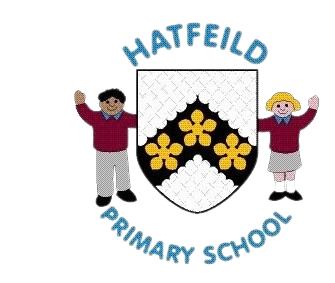Maths
Intent
Why do we teach mathematics? Because the habits of thinking mathematically are life-enriching. Because it is vital to be numerate to participate fully in society and democratic processes. Because our economy depends on a numerate workforce and a significant number of specialists in maths and science-related subjects. At Hatfeild, we are committed to ensuring that children are able to recognise the importance of Maths in the wider world and that they are also able to use their mathematical skills and knowledge confidently in their lives in a range of different contexts. Regardless of a child’s background, we want all children to enjoy mathematics and to experience success in the subject. Furthermore, we are committed to developing children’s curiosity about the subject, as well as an appreciation of the beauty and power of Mathematics.
The 2014 National Curriculum for Maths aims to ensure that all children:
- Become fluent in the fundamentals of Mathematics.
- Are able to reason mathematically.
- They can solve problems by applying their mathematics.
Implementation
The Mathematics curriculum at Hatfeild reflects the content and principles underpinning the 2014 Mathematics curriculum. These principles and features characterise this approach and convey how our curriculum is implemented:
- Teachers reinforce an expectation that all children are capable of achieving high standards in mathematics.
- The large majority of children progress through the curriculum content at the same pace.
- Differentiation is achieved by emphasising deep knowledge and through individual support and intervention.
- Teaching is underpinned by methodical curriculum design and supported by carefully crafted lessons and resources to foster deep conceptual and procedural knowledge.
- Practice and consolidation play a central role. Carefully designed variation within this builds fluency and understanding of underlying mathematical concepts.
- Teachers use precise questioning in class to test conceptual and procedural knowledge and assess children regularly to identify those requiring intervention, so that all children keep up. Children’s explanations and their proficiency in articulating mathematical reasoning, with the precise use of mathematical vocabulary, are supported through the use of stem sentences provided by the teacher.
To ensure whole consistency and progression, the school uses the White Rose Maths scheme, with support also taken from the NCETM. The school’s status as a mastery school, as part of the DfE funded Maths Hubs programme, continues to ensure that staff understand the pedagogy of the mastery approach. This particularly looks at how children can learn maths through well-planned out small steps in order to achieve a greater understanding of each topic.
Within lessons, children are encouraged to solve problems each day through the use of concrete resources, pictorial representations and abstract thinking (the CPA approach). This helps children tackle concepts in a tangible and more comfortable way. Teachers use careful questions to draw out children’s discussions and their reasoning. The class teacher then leads children through strategies for solving the problem, including those already discussed. Children then progress to working through activities in their book.
Mathematical topics are taught in blocks, to enable the achievement of ‘mastery’ over time. Each lesson phase provides the means to achieve greater depth, with children who are quick to grasp new content, being offered rich and sophisticated problems, as well as exploratory, investigative tasks, within the lesson as appropriate.
Impact
The school has a supportive ethos and our approaches support the children in developing their collaborative and independent skills, as well as empathy and the need to recognise the achievement of others. A mathematics education must involve thinking mathematically, developing conceptual understanding, and communicating mathematical ideas. The mastery at Hatfeild enables children to open the dialogue about maths within the classroom and develop a growth mindset. Through regular and ongoing assessment, we aim to ensure that all children experience challenge and success in mathematics, leaving Hatfeild literate in numeracy. This ensures that we are able to push for the highest standards.
Pupil Voice
Jess: Maths is very important because you use it every day. You might have to use it without even realising it. If a farmer has 8 chicken pens and 9 chickens in each pen, they will need to use maths to know how many chickens they have.
